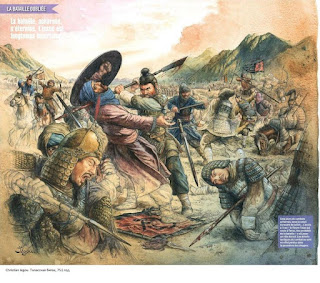The Battle of Talas: Clash of Empires and the Paper Trail of History

Introduction The Battle of Talas, fought in 751 CE near the Talas River in Central Asia, remains a significant turning point in history, marking the clash between the Abbasid Caliphate and the Tang Dynasty. Though relatively lesser known than other major battles, its impact reverberated across empires and shaped the course of history. This article delves into the intriguing story of the Battle of Talas, exploring its historical context, key players, battle tactics, and the unexpected outcome that led to a unique cultural exchange—the dissemination of the art of papermaking from China to the Islamic world. Historical Context To comprehend the Battle of Talas, we must delve into the historical context of the Abbasid Caliphate and the Tang Dynasty. The Abbasid Caliphate, centered in Baghdad, sought to expand its influence over the Silk Road trade routes. Meanwhile, the Tang Dynasty, ruling over a prosperous and culturally vibrant China, aimed to maintain its authority over C...


